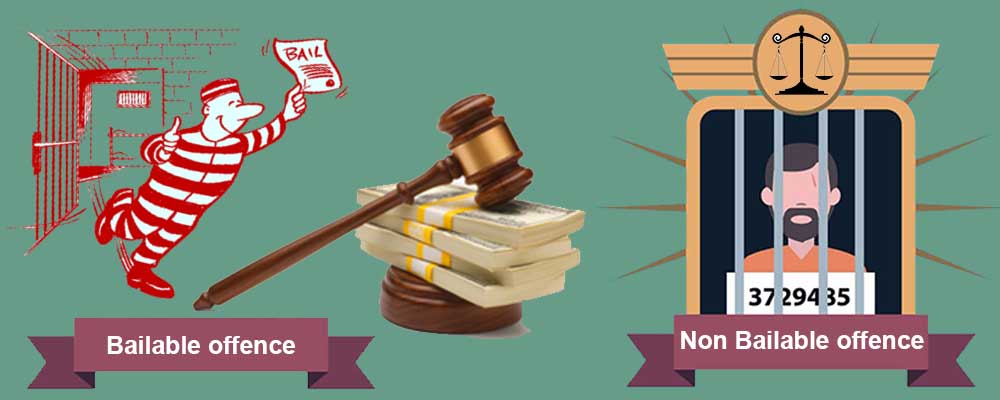Before diving deep into the types of Bailable & non-Bailable offences, we should first know what is an offence? How do we define it?
An offence can be defined as a sinful act which causes violations of other person’s rights and causes them harm. It is also termed as an offence if the act is so dangerous that it harms the society at large is termed as an offence.
According to Section 2 of (CrPC), Offence means “any act or omission made punishable by any law for the time being in force and includes any act in respect of which a complaint may be made under section 20 of the Cattle-trespass Act, 1871”.
What is a bail?
Bail is an instrument which ensures that the accused shall be present before the authorities whenever required by the court. It is an agreement in which an accused person takes a written undertaking to the court to be present there whenever in need. If the person fails to comply by the agreement, an amount is decided by the court which has to be paid by the accused if he fails to meet the demands of the agreement.
Need A Legal Advice
The internet is not a lawyer and neither are you. Talk to a real lawyer about your legal issue

Difference between Bailable & Non-Bailable offence ?
The major difference between the bailable & non-bailable offence is that –
The bailable offence is the one in which taking bail is the matter of right. It can be granted by either the police officer who has the custody of the accused or the court, where as-
The non-bailable offence are those which are more heinous & in such offences bail is not a matter of right. If the accused wants bail, he has to apply to the court and even after that it is court’s discretion to rant bail or not.
Bailable Offences
Bailable offences are the ones which are not very serious in nature. In such cases, the bail is a right & police has the power to grant bail to the accused after signing of the agreement and execution of bail bonds.
Now what is a BAIL BOND?
A bail bond is an agreement in which terms & conditions of granting the bail are mentioned. Terms are as follows –
- The accused will not leave the territory without the permission of police officer or court.
- He must give his presence before the police officer whenever required.
- The accused will not tamper any evidence.
If the accused fails to comply with the bail bond, the court has the authority to not grant the bail even if the offence is bailable.
Examples of Bailable Offences
Under the Indian Penal Code, bailable offences are as follows :-
- Being a member of an unlawful Assembly.
- Rioting, armed with a deadly weapon.
- Public servant disobeying a direction of the law with intent to cause injury to any person.
- Wearing Garb or carrying token used by public servant with fraudulent intents.
- Bribery in relation to elections
- False statement in connection with elections
- Refusing oath when duly required to take an oath by a public servant
- Obstructing public Servant in discharge of his public functions
- Giving or fabricating false evidence in a judicial proceeding
- Selling any food or drink as food and drink, knowing the same to be noxious
- Causing a disturbance to an assembly engaged in religious worship
Non-Bailable Offences
Non-bailable offences are the serious & gruesome offences in which bail is not a matter of right. It is a privilege & can only be granted by the court and that too on it’s own discretion.
The court may refuse granting bail, if the accused fails to execute the bail bond appropriately or if the crime committed by accused is heinous enough that it has a death penalty or life imprisonment as punishment.
Examples of Non-Bailable Offences
- Murder
- Dowry death
- Rape
- Kidnapping
- Voluntary causing serious hurt
- Attempt to murder etc.
Why do you need Lila?
When accused of an offence, the first step everyone should do is to call their advocate & he don’t have one then hire the expert criminal advocate.
Why?
Because obtaining a bail is the most important step for an accused in a criminal justice system. The expert advocate can then guide & help the accused in the process to get bail. Only a lawyer with experience & skill can advise the best possible ways considering the nature of the offence & situation about what to do.
Hence, at LILA, you may find the top notch criminal advocates having various records credited to their names when it comes to criminal offences & bails. For an easy completion of bail process or for any consultation regarding any legal service, you may feel free to contact us on our helpline number- +91 8800788535.





 Talk to a Lawyer
Talk to a Lawyer